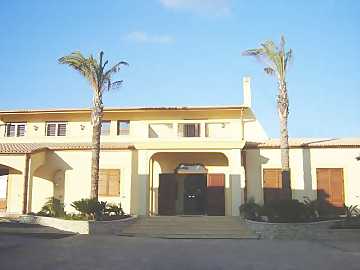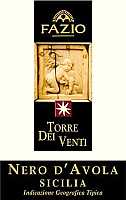|
In the heart of the province of Trapani, on the top of a mountain from which it
is possible to enjoy a wonderful view, surrounded by suggestive streets, history
and monuments witness of the passage of many cultures, is located the enchanting
city of Erice, in which is located - besides the many things - the Foundation
and Center for Scientific Culture “Ettore Majorana” founded by the Nobel prize
Antonino Zichichi. Few kilometers from the top of the mountain where it is
located Erice, is found Fulgatore, the town where are established Fazio winery's
headquarter, not very far from Segesta, renowned for its famous and suggestive
temple, one of the few examples of ancient monuments which arrived in good
conditions up to our times. In this area - whose territory has been recently
recognized as Erice DOC (Denominazione d'Origine Controllata,
Denomination of Controlled Origin) - are located Fazio winery's vineyards, in
the hills surrounding mount Erice in an enchanting and unique view.
|
|  |
| The headquarter of Fazio Winery |
|
Despite Fazio winery was established in 1998, the history of this winery is long
of four generations which have put their commitment with passion and efforts in
viticulture and wine making. The long tradition has been continued and renewed
by Vincenzo and Girolamo Fazio, who introduced in the winery new structures and
wine making techniques, therefore meeting the needs for a modern marketing. The
renewal process has initially focused on the management of vineyards done by a
team of experts and led by wine maker Giacomo Ansaldi, who worked to the
improvement of production, focusing on autochthonous varieties without
neglecting the most important international grapes. In order to strengthen the
bonds between territory and production, Vincenzo Fazio has been involved in a
project which led to the recognition of Erice DOC (Denominazione d'Origine
Controllata, Denomination of Controlled Origin), whose production will be
recognized by the new disciplinary from vintage 2005 on.
The vineyards of Fazio Winery cover an area of about 100 hectares (247 acres),
planted in hills at an altitude from 250 and 500 meters (820-1640 feet), in
areas specifically selected for their exposition, microclimate characteristics
and the geological characteristics of the soil. In these places, in which blow
winds from the north and sea breezes, are cultivated the vineyards of Fazio
winery and which, after harvesting, will produce their wines. The vineyards are
mainly cultivated with the typical autochthonous grapes of Sicily: Inzolia,
Grillo, Catarratto as for white berried grapes - including Muscat Blanc - and
Nero d'Avola, as for red berried grapes. In the vineyards of Fazio winery are
also cultivated the international varieties Merlot, Cabernet Sauvignon and
Syrah, also known as Shiraz. However, among the “international” grapes, Fazio
winery is particularly involved in the cultivation of Müller Thurgau, planted
at an altitude of 500 meters (1640 feet), producing with this grape an
interesting wine.
|
 | |
| A view of Fazio winery's
vineyards. In the background the temple of Segesta | |
|
The structure hosting the cellar of Fazio winery includes the most advanced
technologies, in respect of the architectural style of Sicily, in harmony with
the surrounding nature. The complex is made of two distinct areas. The receptive
structure, in which are located the offices and the wine shop, and the
productive structure, in which it is also located a large underground cellar.
Fazio winery also has cellars used for the aging of wine in which the
temperature is constantly controlled. The grapes - soon after harvesting - are
vinified according to the type of wine to be made. As for white wines, after
destemming, the must is allowed to be in contact with the skins at a temperature
of 4° C (39° F), soft crushing of berries and a very slow fermentation at a
controlled temperature. As for red wines, the grapes are destemmed first and the
skins are left to macerate in the must at a controlled temperature ranging from
25° and 28° C (77-82° F), in variable times and according to the type of wine to
be made.
In the beginning, the production of Fazio winery was mainly destined to the
Italian market, however it took little time to catch the attention of other
countries, the wines of Fazio went beyond the borders of Italy. Today the wines
of this Sicilian winery are commercialized - besides Italy - in Switzerland,
Germany, Belgium, Netherlands, United Kingdom, Norway, Denmark, Hungary, Russia,
Poland, Japan, United States of America, Canada, Singapore and Australia. The
management of Fazio winery is completely done by the family. Vincenzo Fazio,
managing director of the winery, is also in charge for the coordination of
production and commercialization; his wife Roberta manages and supervise
purchases, supervise the feasibility of materials used in the winery as well as
of the image; Girolamo Fazio is in charge for any legal aspect and the
relationships with institutions; his wife Lilly is in charge of the
commercialization of wines, export and penetration of markets.
The production of Fazio winery - with a total yearly production of 700,000
bottles - is made of four ranges: “Linea Classica”, “Linea i Bagli”, “Linea
Élite” and “Linea Spumanti”. The Linea Classica includes Brusìo,
produced with Inzolia and Chardonnay grapes; Gàbal, produced with Nero d'Avola
and shortly aged in cask; Montèlimo, produced with Nero d'Avola and Merlot
grapes. The Linea i Bagli range is made of Torre dei Venti, produced with
Nero d'Avola and aged in cask; Shiraz, aged in cask; three white wines
respectively produced with 100% Inzolia, Grillo and Catarratto. The Linea
Élite is made of Müller Thurgau, one of the best known white wines of Fazio
winery; Merlot, aged in barrique; Cabernet Sauvignon, aged in barrique;
PietraSacra, produced with Cabernet Sauvignon, Nero d'Avola and Merlot, aged in
barrique. Very interesting are the two wines making the spumanti range:
Petali Brut, made with Chardonnay and produced with long Charmat method, and
Petali Moscato, produced with 100% Muscat Blanc with Charmat method.
|









